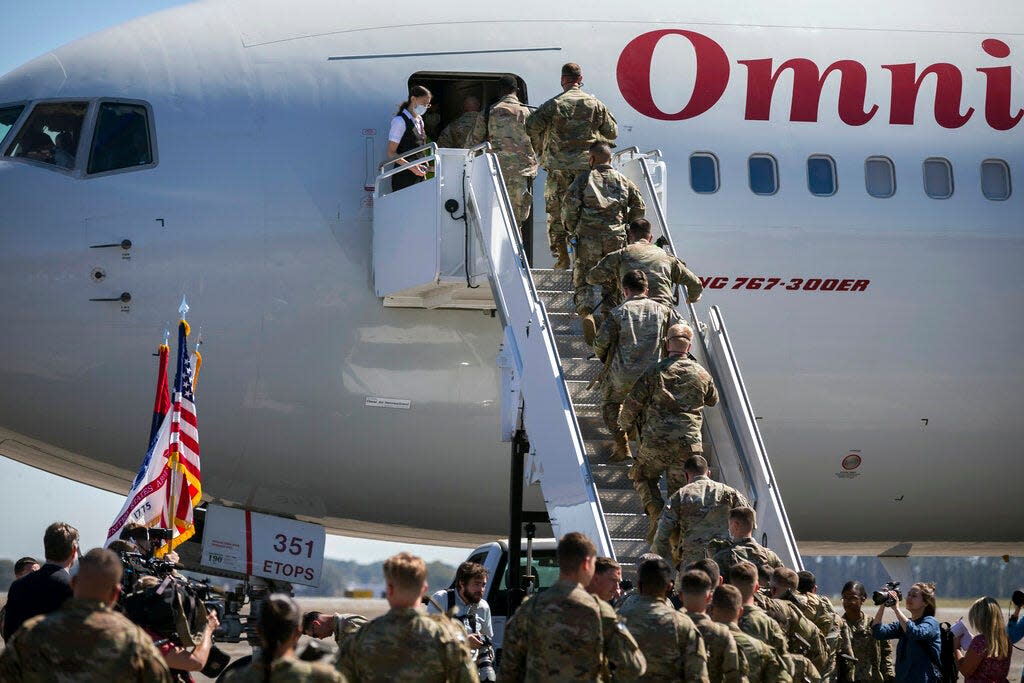Bill would halt unnecessary licensing roadblocks for Georgia's military spouses

This commentary is by Linda McMahon, the Chair of the America First Policy Institute and Doug Collins, the Chair of America First Policy Institute-Georgia and a Colonel in the United States Air Force Reserve.
Military spouses know they are signing up for a tough journey when they get married to a service member. Frequent moves and monthslong deployments come with the territory.
But military spouses often face particularly unnecessary challenges as they pursue their careers — especially if their profession requires a state-issued occupational license. Teachers, engineers, nurses, cosmetologists, real estate agents, accountants, and many more careers require workers to complete training, pass exams, and pay annual fees to join these professions, and many of these licenses do not carry over from state to state.
This is one issue that Georgia can rectify. While some states have created expedited processes or other less bureaucratic hurdles for licensing reciprocity, legislation introduced in Georgia this year, HB 880, changes the game. This bill would make it easier for military spouses to work the jobs they love and provide for their families. Georgia legislators should pass this bill and make this state the best in the country for military spouses to work.
Georgia is home to numerous military bases, including Army, Air Force, Navy, and Marine Corps facilities located throughout the state, and has the largest Army installation east of the Mississippi River in Fort Stewart. Altogether, there were nearly 42,000 active duty, National Guard, and military reserve spouses in Georgia at the end of 2022. This number is constantly changing — on average, military members are transferred every two and a half years, bringing their spouses and families along.
Each state sets its own occupational licensing requirements, which jobs require a license, how much training workers must first complete, what exams they must pass — and nearly one in four jobs now requires a license to work, up from 1 in 20 jobs in the 1950s. Unlike other workers, military spouses have a much shorter window of time in the states where they live. Though many have already put in the work to earn a license in one state, they are often stuck waiting months for their new state’s licensing board to approve their out-of-state license or forced to take extra training or exams — and end up spending as much time reestablishing their competence as actually working in their fields.
Between frequent moves and unhelpful state processes, military spouses have a 22% unemployment rate and a 26% wage gap compared to their civilian counterparts. Many military spouses report waiting 10 months or more to get a licensing credential after a move, at which point their time in the state may be halfway finished.
This is an unacceptable way to treat the families of those who have dedicated their lives to serve and protect our country, and unfortunately, this is one area where Georgia has lagged behind other states. Georgia was among the last states to pass legislation requiring licensing boards to recognize military spouses’ out-of-state licenses. Until 2020, licensing boards had the option of deciding whether or not to allow the license. Even now, licensing boards are allowed to require additional exams for military spouses even if they are licensed in good standing in other states — and boards can take up to 90 days to give applicants a response.
HB 880, in contrast, would allow military spouses to get to work immediately. The bill allows any military spouse to practice their profession for a Georgia-based employer while their spouse is stationed in the state. The employers would be responsible for verifying that their would-be employee’s out-of-state license is active and that the employee is in good standing, but it is much easier for many employers to do this for one or two employees than for every single military spouse to wait for the state to approve their license. State licensing boards would still be permitted to investigate and hold accountable any worker who abuses their license, but under HB 880, spouses would no longer have to wait for a licensing board’s permission to practice their trade.
This America First policy change should be an easy “yes” for every legislator in Georgia. This state is already one of the fastest growing in the Nation, the best place to do business, and home to industries as diverse as filmmaking, manufacturing, healthcare, and agriculture. Now, Georgia has a chance to pass one of the strongest laws in the Nation for our military families — and after everything they have voluntarily given, we owe them that much.
This article originally appeared on Savannah Morning News: Bill would halt licensing roadblocks for Georgia's military spouses

